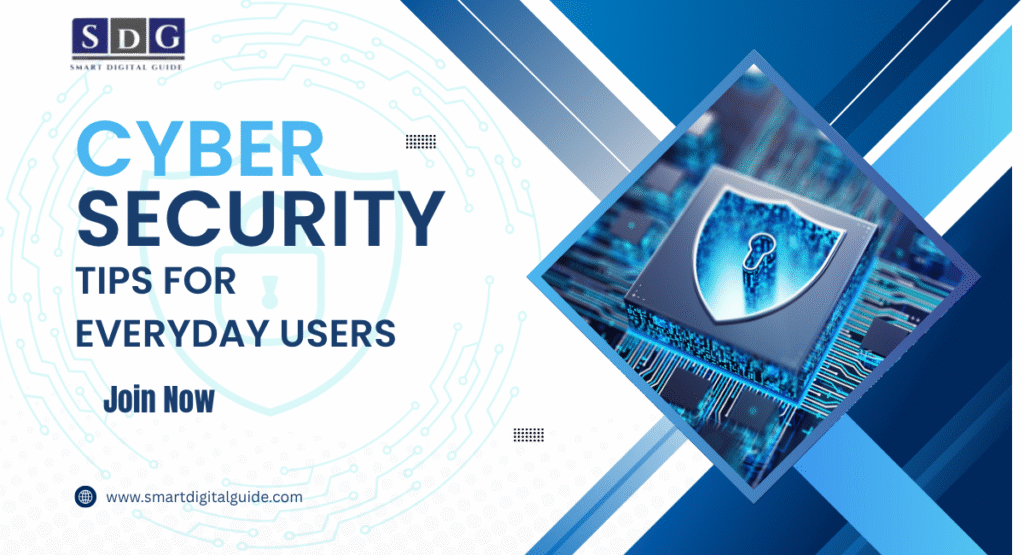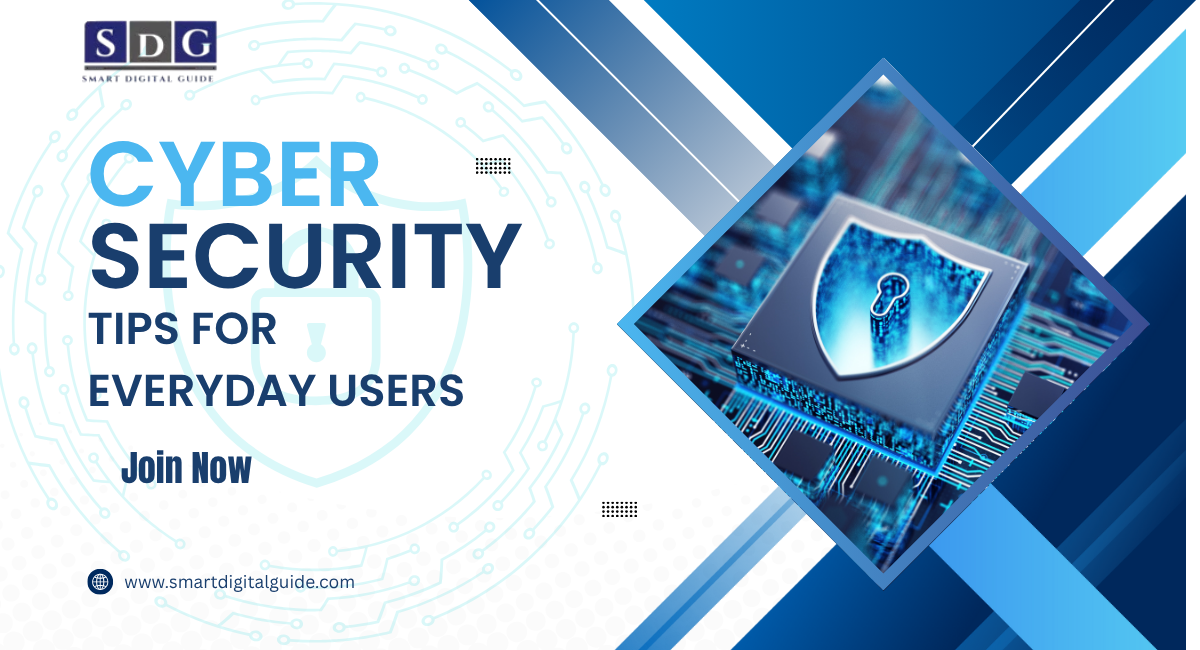In the current digital age, cybersecurity has become a necessity rather than a choice. With the rise in online fraud, data leaks, and phishing schemes, it’s crucial for individuals to learn how to safeguard themselves on the internet. Whether you’re using social media, making purchases online, or reviewing your emails, adopting effective cybersecurity practices can shield you from significant risks. In this article by Smart Digital Guide, we will present 8 essential cybersecurity tips for everyday users that can assist you in staying secure while online.

1. Use Strong and Unique Passwords
A fundamental yet highly effective piece of cybersecurity advice is to develop strong passwords. Steer clear of easily guessable choices such as “123456” or “password.” Rather, opt for a combination of uppercase and lowercase letters, numbers, and special characters. Ensure that you have unique passwords for each account. A password manager can help you securely store your credentials.
2. Enable Two-Factor Authentication (2FA)
Two-factor authentication provides an additional level of protection for your online accounts. Even if cybercriminals manage to obtain your password, they would still require the verification code sent to your mobile device or email in order to access your account. Numerous well-known services such as Google, Facebook, and Instagram support 2FA, making it essential for you to activate this feature as a priority.
3. Beware of Phishing Emails and Links
Cybercriminals frequently employ phishing emails to deceive individuals into disclosing their personal information. These messages may appear to originate from reputable companies, yet they typically contain dubious links or attachments. It is crucial to avoid clicking on unfamiliar links or downloading documents from untrusted sources. A wise cybersecurity strategy is to verify the sender’s email address prior to replying.
4. Keep Your Software Updated
Outdated software tends to attract cybercriminals because of its vulnerabilities. It is crucial to consistently update your operating system, web browsers, and applications with the most recent patches. These updates commonly include vital security improvements that protect your device from malware and viruses.
5. Use a Reliable Antivirus and Firewall
Implementing a trusted antivirus software is essential for safeguarding your device. An antivirus can identify and eliminate malware before it can damage your system. In the same way, a firewall serves as a protective barrier against possible online dangers. By integrating these tools with additional cybersecurity strategies, you create a more robust defense against potential attacks.
6. Avoid Public Wi-Fi for Sensitive Transactions
Public Wi-Fi connections frequently lack security, making them prime targets for cybercriminals. Steer clear of using public networks for online banking, shopping, or entering sensitive personal information. If you find it necessary to connect to public Wi-Fi, contemplate employing a Virtual Private Network (VPN) to encrypt your data and enhance your protection.
7. Backup Your Data Regularly
Ransomware incidents and unintentional data loss are frequent challenges. To protect your vital files, it is essential to consistently create backups using cloud storage or an external hard drive. This cybersecurity advice guarantees that in the event of data compromise, you will have a secure version available for recovery.
8. Be Aware of Social Engineering Scams
Cybercriminals frequently employ social engineering tactics to deceive individuals into disclosing confidential information. Exercise caution if anyone requests personal or financial details through phone calls, texts, or social media platforms. Always confirm the identity of the requester before sharing any information.
Why Cybersecurity is Important for Everyone?
Cybersecurity isn’t solely the responsibility of businesses or IT experts; it’s essential for anyone who relies on the internet. Just one lapse in judgment can result in identity theft, financial setbacks, or compromised information. Implementing these cybersecurity strategies can greatly lower your chances of falling prey to cybercriminals.
Final Thoughts
Ensuring your safety online doesn’t necessitate specialized knowledge. Basic measures such as creating robust passwords, activating two-factor authentication (2FA), and steering clear of questionable links can significantly enhance your security. These eight essential cybersecurity recommendations for average users are straightforward to apply and can shield you from significant internet dangers.At Smart Digital Guide, we understand that being informed is the initial move towards secure online practices. Therefore, begin utilizing these tips now and pass them along to your friends and family to contribute to a safer internet community for all.









